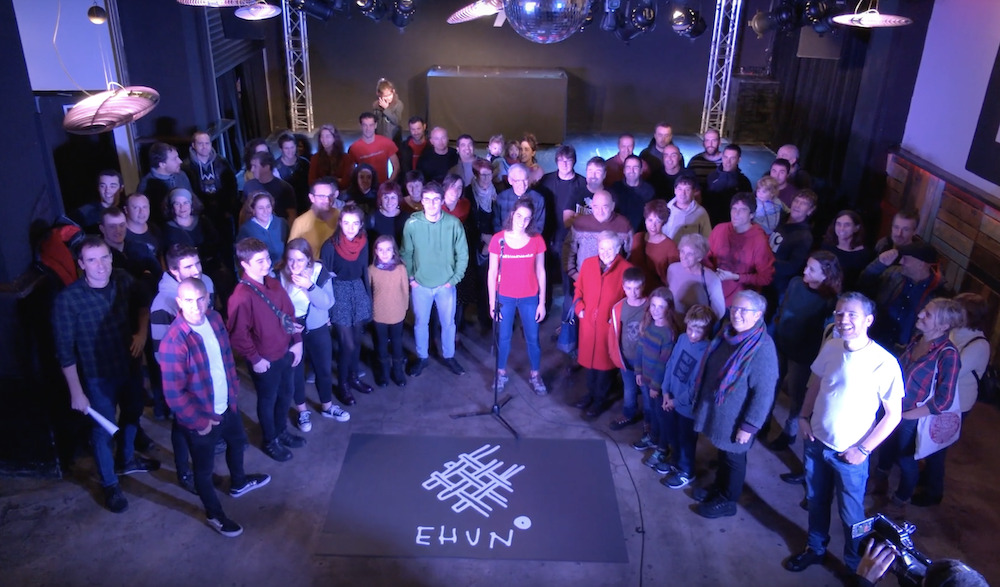
From 19 to 21 October, Hernani held a conference of sovereignty to learn, share and reflect on “transformative experiences”. The talks and activities have been carried out through the citizens' initiative Hernani Burujab, but have also been promoted by the City Hall of Hernani and Udalbiltza. In fact, the objective has been to address urban and municipal activity from a transformative point of view, and councilman Itsaso Lekuona has recalled that the Hernani Burujaba project has three vertices: citizen, public and economic. But how do we reconcile citizenship in town hall and city hall in town?
Lekuona has acknowledged that many times the city council acquires “overweight” and that the balance between vertices has to be boosted to “put them all at the same pace”. But it's hard. Lekuona points out two important points for achieving balance. On the one hand, it stresses the need for citizens to also have decision-making spaces, that is, for the City Hall to offer it to the citizens and to make them part of what happens in their municipality. On the other hand, it asks the citizens to be responsible for being in the decision-making centers, that is, that the citizenship also be active and participate in their municipalities. Participation is a right, but if you want a transformation of the people, the way of life, the Basque Country or the system, you also have an obligation.
In 2021, several Hernaniarras took on this citizen responsibility, and launched the Hernani Buruamendi initiative, claiming “we recover control of our resources”. They argued that the municipality has an appropriate context for this: farmers and farmers who operate in rural areas, industry, strong trade and also “political will and popular movement”. Since then, traders, producers and agents operating in the transforming economy of the city have been engaged in the initiative. This diversity of sectors has been reflected in the Independent Conferences.
On 19 October the expert rapporteurs reflected on the municipal issue and sovereignty and gave it a theoretical framework. Two of the keys that were worked on were how to combine and influence synergies between citizens and municipalities. For example, Laia Forné, from the cooperative La Hydra, shared his experience at the City Hall of Barcelona and committed to public-community governance.
The lectures on the first day were held in the hall of events of the City Hall, and passed on 20 October from the theorization in the administrative space to the Plaza Feminista Intercultural, managed by the City Hall and which groups various agents. To “demolish emancipations”, four areas were addressed that are the axis of daily citizenship: food, care, education and work.
On the third day they jumped into the street. In the open space, in the town square, in the streets... a walk of sovereignty was made, so that we could all see the production, the projects and the cultural creations of the citizens in the public space. In the coming months it will be seen whether public, cooperative and citizen collaboration is viable and effective.
Topatu eta topa! Tipi-tapa, elkarrekin ekin eta, bidea, eginean egin aurrera. Mahaiak, aulkiak, koadernoak eta boligrafoak, platerak, konfidentziak, tragoak eta ahotsak, eskuak, ideiak eta barreak, borrokarako besarkada gozoak. Txistulariak bileran, erraldoiak lasterka eta... [+]
Independentziaren aldeko ekimenak aurrera eramateko baliabide faltagatik "itzaliko" da. Aurretik, Euskal Herri osoko 101 udaletan independentzia mozioak erregistratuko dituztela iragarri dute, euskal errepublikaren aldeko prozesuan urratsak egiteko. Baliabide faltaz... [+]
Euskal Herriko bi muturretatik datoz Itziar (Bilbo, 1982) eta Ekaitz (Erriberri, 2002), sortzen ari den Burujabetzaren Aldeko Mugimenduaren berri ematera. Euskal Herrian diren burujabetza prozesu ugariak arloz arlo bultzatu eta indartu nahi ditu BAMek. Lan horretan hasteko,... [+]
The society in which we live is absolutely based on subordination. Over the centuries, our lives have been shaped according to it, and little by little the power of decision, freedom and sovereignty have been reduced. Sometimes they've taken us away with force, sometimes we've... [+]
In Basque public schools, teachers play a fundamental role in the management of diversity. They have had to reinvent their way of doing their work in recent years. Public schools seem to me to be laboratories to explore what it is to be a person in a more complex world. Teachers... [+]
Relations between the Basques and Castilla and the present Spain have not been tender. The conquest of the Basque territories that began in 1200 from Vitoria has left us over the centuries many bloody episodes. Thousands of people killed in the conquest of Navarre and in the... [+]
“Iñon is not in the subalterna, himself,
We all come together without the future.”
Joxean Artze / Mikel Laboa
These are our observations on the letter of 8 September of the vital movement “Sovereignty(s): what we want to prioritize”.
“Honestly, there is no reason... [+]
In view of the political situation in Spain, it may be thought that for years its main parties will need the votes of the nationalist peripheries to form governments in Madrid. Can this allow us to take other steps around plurinationality in Spain? In this context comes the... [+]
Independent of Bizi. Many of the ideas of the project Recovering our living conditions are deeply criticized, but we are willing to interview with militants of the Bizi movement.
According to Elhuyar's translation, French means independent, sovereign, and sovereignty means... [+]


















